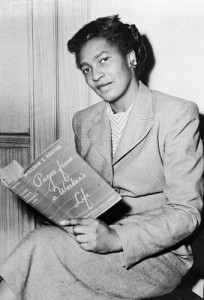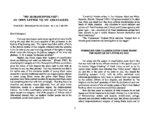 Journalist, editor, intellectual-activist, communist theorist, community leader and human rights advocate Claudia Vera Cumberbatch Jones (1915-1964) was born February 21, 1915 in Trinidad and Tobago. After years of membership beginning as a teenager, she became the only black woman on the central committee of the Communist Party USA and Secretary of the Women’s commission in 1947. In that role, she organized women’s groups across the United States and wrote a Women’s Rights column titled “Half the World” for The Daily Worker. A speech titled “International Women’s Day and the Struggle for Peace” delivered on International Women’s Day in 1950 was cited as the “overt act” which led to her arrest, trial, conviction, and imprisonment for being a communist in the United States. In December 1955, she was deported to England because she was still then a Commonwealth “subject.” There, she became the founder of the first black newspaper in London, the West Indian Gazette and Afro-Asian Caribbean News (WIG) in 1958 and developed a praxis that bridged the United States and United Kingdom, informed by the world politics of decolonization. She organized a parallel March on Washington in 1963 and met world leaders like Martin Luther King, Jr., Mao Tse-Tung, Norman Manley, Cheddi Jagan, and Jomo Kenyatta of Kenya. Continue reading →
Journalist, editor, intellectual-activist, communist theorist, community leader and human rights advocate Claudia Vera Cumberbatch Jones (1915-1964) was born February 21, 1915 in Trinidad and Tobago. After years of membership beginning as a teenager, she became the only black woman on the central committee of the Communist Party USA and Secretary of the Women’s commission in 1947. In that role, she organized women’s groups across the United States and wrote a Women’s Rights column titled “Half the World” for The Daily Worker. A speech titled “International Women’s Day and the Struggle for Peace” delivered on International Women’s Day in 1950 was cited as the “overt act” which led to her arrest, trial, conviction, and imprisonment for being a communist in the United States. In December 1955, she was deported to England because she was still then a Commonwealth “subject.” There, she became the founder of the first black newspaper in London, the West Indian Gazette and Afro-Asian Caribbean News (WIG) in 1958 and developed a praxis that bridged the United States and United Kingdom, informed by the world politics of decolonization. She organized a parallel March on Washington in 1963 and met world leaders like Martin Luther King, Jr., Mao Tse-Tung, Norman Manley, Cheddi Jagan, and Jomo Kenyatta of Kenya. Continue reading →
Attachments

An End to the Problems of the Negro Woman!


